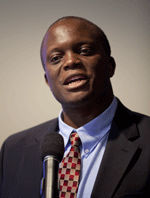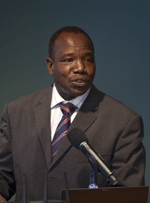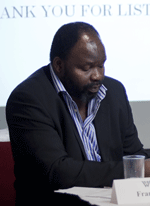Is Universal Access to Family Planning a Realistic Goal for Sub-Saharan Africa?
Michael Mbizvo, director of the Department of Reproductive Health and Research at the WHO, discusses ways to ensure universal access to family planning services for sub-Saharan Africa.To talk about this difficult question and present research and programmatic evidence for sub-Saharan Africa, Mbizvo was joined by panelists; Fred Makumbi, Oladosu Ojengbede, and Frank Taulo.
Overview
"What do we require to ensure universal access to family planning services that are appropriate, affordable, accessible, and of good quality?" asked Michael Mbizvo, director of the Department of Reproductive Health and Research at the World Health Organization.
To talk about this difficult question and present research and programmatic evidence for sub-Saharan Africa, Mbizvo was joined by panelists Fred Makumbi, senior lecturer and head of the Department of Epidemiology and Biostatistics at Makerere University, Uganda; Oladosu Ojengbede, director of the Center for Population and Reproductive Health, University of Ibadan, Nigeria; and Frank Taulo, director of the Center for Reproductive Health and senior lecturer of obstetrics and gynecology at the University of Malawi.
Integrating Family Planning and HIV Services
 Makumbi shared a number of findings on fertility preferences, behaviors, and contraceptive uptake in the context of HIV infection and care in Uganda. "Integrating family planning services into HIV services could help address the family planning needs of both HIV infected and uninfected," he said.
Makumbi shared a number of findings on fertility preferences, behaviors, and contraceptive uptake in the context of HIV infection and care in Uganda. "Integrating family planning services into HIV services could help address the family planning needs of both HIV infected and uninfected," he said.
According to new research conducted as part of the Rakai Community Cohort Study, despite significant gains in family planning use over time, there is still a high unmet need for contraception, irrespective of HIV status, in the Rakai district located in central Uganda, said Makumbi. Male partner's fertility desires were found to play an important role in pregnancy rates, and compared with previous studies conducted in the Rakai district, researchers saw an increase in pregnancy incidence and prevalence among HIV positive women, especially those on anti-retroviral therapy. HIV care that included voluntary counseling and testing was associated with significant increases in the use of family planning, and in particular, the use of condoms.
To effectively promote universal family planning in sub-Saharan Africa, "there is a need to strengthen family planning services in HIV care programs, with promotion of modern contraceptive methods, and with particular attention to women on anti-retroviral therapy," said Makumbi. "Strategies to address desire for high fertility need to be developed, especially with regard to male involvement," he added.
Multi-pronged Approach to Universal Family Planning
 "Family planning success in sub-Saharan Africa is a must for the region's sustainable development," said Ojengbede. "Poor commitment to women's health in sub-Saharan Africa" has not only resulted in high fertility rates and poor maternal health indices but has also negatively impacted economic and human development in the region, said Ojenbede.
"Family planning success in sub-Saharan Africa is a must for the region's sustainable development," said Ojengbede. "Poor commitment to women's health in sub-Saharan Africa" has not only resulted in high fertility rates and poor maternal health indices but has also negatively impacted economic and human development in the region, said Ojenbede.
To increase access to and use of family planning in the region, Ojengbede stressed the need to generate and sustain government commitment, promote legislation to support women's autonomy, and implement policies to improve access to quality reproductive health services.
At the community level, Ojengbede said, the public health community must work to integrate family planning services into all reproductive health programs, including prevention of mother to child transmission (PMTCT), accelerate female empowerment programs, actively engage males in family planning access and uptake, and address social and cultural barriers that prevent widespread adoption of family planning.
"Traditional rulers can occupy a critical position to enact positive change in their communities and at the national level," said Ojengbede. In Nigeria, for example, providing education about the health and economic benefits of family planning has helped traditional leaders embrace family planning and develop their own strategies to promote birth spacing in their communities.
"Universal family planning access must be achieved through a multi-pronged approach that should be colored with socio-cultural sensitivity, solid evidence, and sustainability," concluded Ojengbede.
Eliminating Unmet Need: "Yes, We Can"
 "It is time to prioritize issues that are affecting women and family planning is a very critical area," said Taulo.
"It is time to prioritize issues that are affecting women and family planning is a very critical area," said Taulo.
There are still many challenges to overcome before Malawi can achieve universal family planning, including poverty, misconceptions and myths about family planning, lack of availability of reproductive health supplies, poor infrastructure, shortage of trained professionals, and religious and cultural barriers.
"Commodities are also very much dependent on the donor," said Taulo, pointing to the challenges of insufficient funding and political will. "Failure to connect family planning to economic development and political stability is one of the main areas that we are struggling with," he added.
"We have lots of challenges, but also many achievements," said Taulo. Malawi has made important strides in expanding access to family planning by implementing community-based strategies and youth-friendly programs, developing public-private partnerships, engaging policymakers and traditional leaders, and encouraging media coverage of family planning issues.
"Education is another family planning product," said Taulo. Moving forward, a "deliberate focus on girl child education" and promotion of women's welfare can have a major impact on fertility reduction, he said.
"We can eliminate unmet need for family planning in Malawi, if we put our heads together, our thoughts together, and our energy together," concluded Taulo.
Drafted by Ramona Godbole and edited by Schuyler Null and Meaghan Parker
Calyn Ostrowski, Global Health Initiative, 202-691-4341
Documents & Downloads
- Is Universal Access to Family Planning a Realistic Goal for Sub-Saharan Africa?Download
- Is Universal Access to Family Planning a Realistic Goal for Sub-Saharan Africa?Download
- Is Universal Access to Family Planning a Realistic Goal for Sub-Saharan Africa?Download
- Is Universal Access to Family Planning a Realistic Goal for Sub-Saharan Africa?Download
- Is Universal Access to Family Planning a Realistic Goal for Sub-Saharan Africa?Download
- Is Universal Access to Family Planning a Realistic Goal for Sub-Saharan Africa?Download
Speakers
Hosted By

Environmental Change and Security Program
The Environmental Change and Security Program (ECSP) explores the connections between environmental change, health, and population dynamics and their links to conflict, human insecurity, and foreign policy. Read more

Maternal Health Initiative
Life and health are the most basic human rights, yet disparities between and within countries continue to grow. No single solution or institution can address the variety of health concerns the world faces. By leveraging, building on, and coordinating the Wilson Center’s strong regional and cross-cutting programming, the Maternal Health Initiative (MHI) promotes dialogue and understanding among practitioners, scholars, community leaders, and policymakers. Read more
Thank you for your interest in this event. Please send any feedback or questions to our Events staff.










